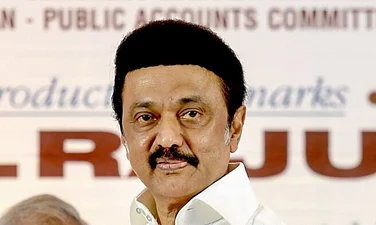- Sonia has dishonoured the coalition dharma, spreading distrust among allies
- Younger leaders left out. Still relies on 70-plus old guard.
- Allows party courtiers to influence decisions
- Back to old Congress way of manipulating governors
- Failed to respect regional forces
The Congress spin doctors have this take. Sonia Gandhi won Haryana. Old war horses Arjun Singh and M.L. Fotedar botched up Bihar and Jharkhand. But really, who is to blame for the Congress snatching defeat from the jaws of victory? In the final analysis, it has to be party president Sonia Gandhi. It was she who decided and dispatched the election managers. It was she who put the ink on which party the Congress would ally with. Though there is no sting operation to prove that the Congress manipulated the governor of Jharkhand to call Shibu Soren, the fact is he did form the government despite having less 'numbers' than the NDA. Suddenly, the Congress does not look as principled as when Sonia sacrificed prime ministership after the Lok Sabha elections. Jettisoned are the coalition dharma and the pragmatism of coexistence.
Congress leaders admit the abysmally poor electoral management in Bihar and Jharkhand has adversely affected the image of Sonia Gandhi. The focus now is on Sonia's failure to forge effective electoral alliances in these two states, something that has cost the party dearly. Worse, it has brought back unhappy memories of the Congress browbeating the ncp, its electoral ally in Maharashtra. The latter had to accept the status of junior partner in the state government, though it had won more seats than the Congress. Suddenly, questions are being raised about whether Sonia respects coalitions at all.
And so, Union minister E.V.K.S. Elangovan's remark that the Congress should aim to share power in Tamil Nadu as the party was "not in politics to put others in the saddle" is now being seen by allies as part of an emerging pattern. Clearly, for the Congress, managing a harmonious relationship with its electoral partners while trying to regain the political space it has lost over the years is proving difficult. These elections have only too clearly focused attention on the Congress's innate discomfort with coalition politics, even though it pays lip service to it through mechanisms such as the UPA coordination committee. Congress allies are already saying the party must face the fact that it is living in a coalition era and start following the coalition tenets, or else the UPA itself may be in trouble—if not immediately, certainly in the long term.

When the UPA government came to power in 2004, much of the credit went to Sonia Gandhi. She had steered the Congress to the position of the single largest party. Finally, she appeared to have found her political feet. In 1999—when she had made a disastrous attempt to form a government at the Centre after the NDA government fell—she had learnt the importance of establishing a personal relationship with leaders of like-minded parties. The electoral rout of the Congress in the Madhya Pradesh, Rajasthan and Chhattisgarh assembly elections in 2003 saw her hit the road.
It was not just her "road shows" or the failure of the NDA's India Shining campaign that helped the Congress emerge at the head of the pack. It was also the foresight with which she stitched up effective electoral alliances in Tamil Nadu, Andhra Pradesh, Bihar, Jharkhand and Maharashtra, in keeping with the resolve the party had taken in Shimla in July 2003 to adopt the coalition path if that was required to defeat the BJP-led NDA.
Yet nine months later, Sonia Gandhi inexplicably abandoned her winning 2004 formula, allowing her advisors to convince her that the Congress's numerical score of 145 Lok Sabha seats—a figure not far from the ones that the late, much reviled P.V. Narasimha Rao and Sitaram Kesri had produced—was actually worth much more. Party heavyweights told her that the general elections had demonstrated that she was the biggest vote-catcher in the country, and since the Congress was a party of governance, the people wanted to see it back in the saddle everywhere.To ensure that the RJD gave the Congress the seats it wanted in Bihar, it should exclude Laloo—the biggest and most loyal UPA partner—out of the pre-electoral arrangement it forged in Jharkhand. The result: a bizarre line-up in Bihar where it tied up for 12 seats with the RJD and close to 70 with Paswan's Lok Janshakti Party (ljp).
The result: the NDA rose, Phoenix-like, from the ashes. So the Congress, in a bid to prove that its electoral strategy had not gone wrong, began to do what historically it does best—manipulate its men in the Raj Bhawans. The buzz is it is not just in Jharkhand but also in Bihar that the governor's card will be played.
Take Jharkhand. The BJP-JD(U) emerged as the single largest pre-electoral combination with 36 seats, 10 ahead of the Congress-jmm line-up. But see what the Congress did. It implemented the plan that the BJP had feared all along. Former finance minister and BJP leader Yashwant Sinha had articulated this to Outlook before the results came in: "We need to get one more seat than all the UPA allies if we are to form a government."
And indeed, that is what has happened. The Congress presented all UPA partners and friends—even if they had fought against each other—and came up with a figure ahead of the BJP-JD(U) combine. A Shibu Soren-led government was sworn in what seemed like unseemly haste. Contrast its hurry in Jharkhand with the leisurely manner in which the Congress is selecting a chief minister for Haryana, a state in which it is a clear winner.
The blame game has begun in the Congress. But it excludes Sonia. In the eye of the storm is Union hrd minister Arjun Singh who, along with another of the 70-plus generation, Makhanlal Fotedar, crafted the Bihar-Jharkhand strategy. The former is already distancing himself from the electoral disaster. Here's Arjun Singh's cryptic reply: "I was carrying out the party mandate. I did nothing on my own." But Fotedar feels it's a job well done. Party sources say that he has been gleefully telling people that "a crippled Laloo is no danger as he will no longer be able to walk". Sadly indicative of the party's attitude towards a man who has been the party's staunchest ally and Sonia's steadfast defender.

There is a hint of a post-mortem, at least publicly. Already, there are murmurs within the Congress that those in their late 60s and 70s should retire to make way for newer leaders. But there is simultaneously an effort to defend a strategy which failed and offer excuses. Says party secretary Ambika Soni: "At the appropriate time, there will be an assessment of these elections and a call for accountability. Every political party looks to retain and increase its support base. In Srinagar, we have a coalition with the PDP but recently we fought the Baramulla seat separately. We lost but it helped to ensure that the party's space did not shrink. The UPA coalition was formed not to share power alone as the NDA was—it was formed on the basis of an ideological (secular) bonding. For instance, when the UPA was formed with Left support, everyone knew they would face each other in assembly elections in Kerala and West Bengal in 2006. UPA partners may fight for political space with each other but the leadership of the political parties in the UPA will ultimately analyse whether they wish to bring the communal forces back to power."
But if most of the UPA's allies are anti-BJP, they are equally clear that they are against the Big Brother Congress mindset. This could well pave the way for the re-emergence of a Third Front.Left sources say that while the Kerala or West Bengal elections would not be a trigger for the break-up of the UPA, if a Third Front emerged minus the BJP, then the Left would reconsider its current position.Says a Left leader: "If, for instance, the RJD teamed up with the JD(U) in Bihar, that could become the nucleus of a nationwide emergence of a Third Front."
The Nationalist Congress Party's Tariq Anwar makes it clear that the party has not forgotten its humiliation in Maharashtra: "The Congress must realise it is living in a coalition era, and take its allies into confidence; otherwise the UPA could be in danger." The current bitterness of the RJD against the Congress notwithstanding, Union rural development minister and RJD leader Raghuvansh Prasad Singh says: "The Congress knows how to govern—it should now learn the art of running a coalition .How did the Congress, for instance, think it could form a government in Jharkhand without the RJD?"
Today, most allies are speaking in the same tone. Points out former West Bengal minister and now CPI(M) MP Mohammad Salim: "The Congress should not just profess its belief in coalition politics; it should also practise it. As the largest partner in the UPA, it must take care of its allies, not make them feel they are just part of the arithmetic needed to form a government.''
Even an ally which seldom complains, like the PDP, is doing some plainspeaking. Says PDP president Mehbooba Mufti: "We've seen the good side of the Congress. Through the UPA, it has been supportive of the reconciliation and dialogue process. It has started work on the highway to Muzaffarabad. During the recent heavy snowfall, it sent help. But the Congress which once enjoyed absolute power across the country no longer does so. The new regional parties have carved their bases out of what once belonged to the Congress. Some Congressmen may think they can retrieve that base, but the reality is that the regional parties—whether in Kashmir or Bihar—are addressing local aspirations. In the coalition era, each will have its own space."
So will the Congress debacle in Bihar and Jharkhand—regardless of which party makes it to power—lead to some serious introspection? Former Madhya Pradesh chief minister and party general secretary Digvijay Singh feels it will. "Certainly, yes. The Congress is in the learning process of coalition formation." Even Arjun Singh agrees: "There is a lesson in every situation and lessons must be learnt." The lesson for Congressmen who thought Sonia Gandhi would wave her magic wand and the votes would come rolling in is that charisma is not enough unless backed by intelligent strategy and a strong organisation.


























